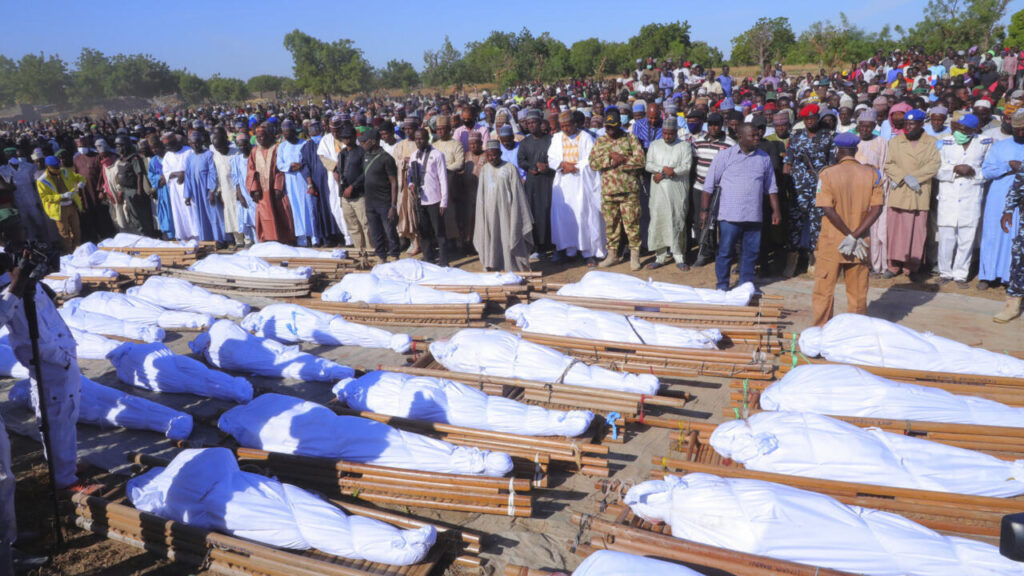MAIDUGURI, Nigeria — In one of the deadliest militant assaults in Nigeria’s northeast this year, at least 57 civilians were killed and more than 70 others remain missing following a brutal attack on two villages in Borno State by suspected members of the Boko Haram JAS faction, witnesses said Sunday.

The assault unfolded Thursday in the Baga region of Borno, where militants targeted the neighboring communities of Mallam Karamti and Kwatandashi, forcibly gathering over 100 residents and marching them deep into the bush. Survivors reported the attackers accused the villagers of collaborating with the rival jihadist group Islamic State West Africa Province (ISWAP). Days later, bodies were discovered, most with throats slit, others bearing gunshot wounds.
“There are likely more victims,” said Abdulrahman Ibrahim, a local from Mallam Karamti who survived the attack and helped bury the dead. “We had to halt further searches due to fear of militant ambushes, even with soldiers around.”
Government officials have yet to confirm the death toll. A spokesperson for the Borno State government declined to verify casualty figures, and the Nigerian military did not respond to multiple requests for comment from The Associated Press.
The Thursday massacre marked a grim escalation in the Jama’atu Ahlis Sunna Lidda’awati wal-Jihad (JAS) faction’s violent campaign. Unlike ISWAP, which primarily targets Nigerian military installations, JAS has turned its focus to civilians and suspected informants, sustaining itself through kidnappings and extortion, according to security analysts.
“Without the military capabilities of ISWAP, JAS now thrives on terrorizing civilians,” said Malik Samuel, a conflict analyst with Good Governance Africa, a regional research organization.
The delay in retrieving and burying the dead reflected not only the remoteness of the attacked villages but also the ongoing security vacuum in large swaths of Borno State. Survivors said they waited days for any semblance of military support, only to conduct most of the burials themselves under the looming threat of further violence.
The massacre came amid a surge in attacks across Borno. On Monday, ISWAP fighters stormed the 50 Task Force Battalion base in Marte, killing several soldiers and capturing military hardware, according to videos shared by surviving troops. The aftermath triggered the mass displacement of residents and aid workers from Marte to Dikwa, a key humanitarian hub.
The United Nations and other aid agencies have begun scaling back operations in Dikwa and surrounding areas amid funding shortfalls and escalating threats to humanitarian personnel.
Just days after the attack in Baga, violence continued on Saturday afternoon with a roadside bomb explosion on the Maiduguri-Damboa highway — the second such bombing in a week. The blast killed three people instantly, and a fourth died the following morning at the University of Maiduguri Teaching Hospital (UMTH). At least 10 others are receiving treatment, according to Lawan Bukar Maigana, a local community leader who assists in emergency responses.
Since its inception in 2009, Boko Haram’s insurgency has devastated the Lake Chad region — encompassing Nigeria, Niger, Cameroon, and Chad — killing over 35,000 people and displacing 2.6 million, according to U.N. estimates. Borno, Boko Haram’s birthplace, remains the epicenter of the crisis.
The group’s ideological goal remains unchanged: to establish an Islamic caliphate across West Africa, with Nigeria — the continent’s most populous nation and top oil producer — as its strategic prize. The country’s population of more than 200 million is almost evenly split between a predominantly Muslim north and a largely Christian south, creating a complex and often volatile religious dynamic.
Despite Nigerian government claims of progress against insurgent groups, both Boko Haram factions and ISWAP continue to launch attacks on civilian and military targets. Experts warn that these groups are expanding operations into central Nigeria, threatening areas around the capital Abuja and beyond.



